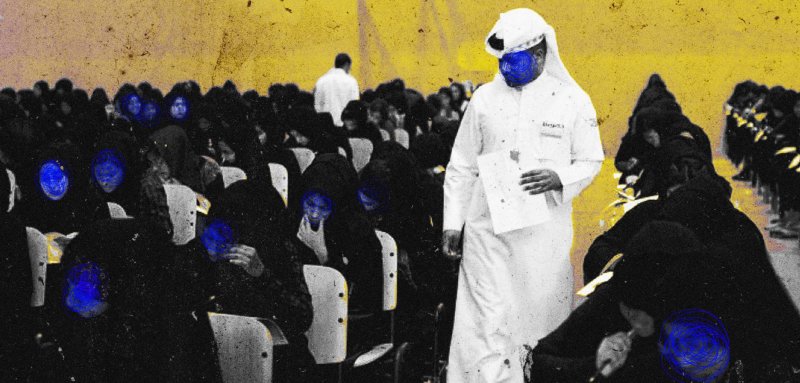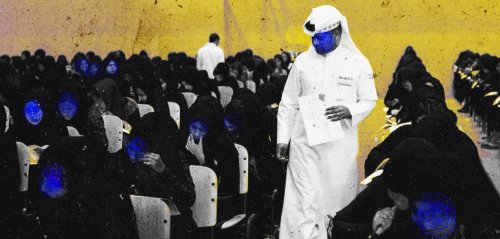Zainab al-Sayed Shibr graduated from high school in 2021 with an average of 99.5%, to become one of the top students in Bahrain. With dreams of studying medicine, Zainab applied for a medical scholarship because her family could not cover the costs of her education, but she was turned down.
As stated in a local Bahraini newspaper, the young lady wrote a letter where she appealed for help to realize her dream in order “to advance and elevate myself for my country and strive to achieve its vision and aspirations”.
Every year, the Bahraini Ministry of Education provides high school graduates from public and private schools with grants and scholarships to pursue their university studies “according to the field they choose, and in line with certain conditions and criteria,” according to what was stated on the ministry’s website.
There are other opportunities available for students, such as the Crown Prince’s International Scholarship Program, and the grants of the Al Mabarrah AlKhalifia Foundation, which single-handedly decides who to grant its scholarships to.
The Ministry of Education controls the scholarships of the Royal College of Surgeons in Ireland at the Medical University of Bahrain (RCSI Bahrain), the British University of Bahrain, the Chinese Government Scholarship and grant program, and the University of Birmingham scholarships, while the Ministry of Foreign Affairs controls the grants and scholarships that embassies and foreign governments offer under an official circular since April 2017.
Is there some sort of problem with the allocation of grants and scholarships to outstanding and deserving students? Is there transparency in the eligibility and selection process, especially in light of the Bahraini Ministry of Education refraining from publishing the names of students who have received scholarships and grants since 2012?
Complaints and a Sense of Injustice
In a study conducted in 2015 by the education team of the Al-Wefaq National Islamic Society (dissolved by the government in 2016) on a sample of 49 high-achieving students with averages over 95%, it was found that 34% of these students were denied scholarships, and that 82.2% of them were denied their first choice for major.
A top high school graduate majoring in “Chemistry and Biology” with a 94.9% average had applied for a scholarship to enter the College of Health Sciences. The student who had wanted to study radiology tells Raseef22, “This has been my dream since childhood, but I was granted my fifth choice of major, which is to study Arabic,” calling this “an injustice”.
The student requested that her name not be mentioned, for fear of being targeted, but we have documents proving that despite her excellent grades, she was only granted her fifth choice.
For his part, student Hussein al-Aradi graduated in 2019 with an average of 86% albeit with multiple disabilities, according to a document he submitted to Raseef22, but he lost a scholarship grant for students suffering from disabilities. “When I went to the ministry, the distance between the car and the door was short, so I did not carry the crutch that usually helps me walk, and when I entered, they assumed that my disability was a minor one, and thus did not deserve the grant,” he tells Raseef22.
Is there a problem with the allocation of grants and scholarships to qualified and outstanding students? Is there transparency in the eligibility and selection process, especially with Bahrain not releasing the names of students awarded grants since 2012?
Al-Aradi is studying today for a Bachelor’s degree in Arabic language at the University of Bahrain at the expense of his family, after the Ministry of Education refused to recognize the report submitted by the Ministry of Health proving that the young man is multi-handicapped, thus depriving him of the grant.
Every year, for the past ten years, the Bahrain Transparency Society (BTS), a civil society that works to promote transparency and combat corruption in Bahrain, issues an annual statement calling on the Ministry of Education to publish the results of the allocation of grants and scholarships in the local press. It maintains this practice in implementation of the principle of transparency and the right of access to information as well as to verify that the ministry had followed fair professional standards when it comes to distributing scholarships to deserving students without any discrimination or favoritism, whether they were ones granted by the ministry itself, provided by major companies, or granted by foreign governments through their embassies in Bahrain.
The society believes that depriving outstanding students of opportunities to study the majors they strive for violates Bahrain’s commitments as stated in the Convention against Discrimination in Education adopted by the General Conference of the United Nations Educational, Scientific and Cultural Organization, which was ratified by Bahrain and has become part of its national legal system.
Sharaf al-Mousawi, chair of the Board of Directors of the Bahrain Transparency Society on Policies and Relations, tells Raseef22, “We urge parents and students to file grievances and complaints regarding the results of the allocation of scholarships with the ministry. We have also called on and appealed to the ministry to change its approach when it comes to distributing scholarships, but unfortunately we haven’t been met with a response on their part to do so or to at least publicly announce the results.”
“To Safeguard Privacy”
In response to Raseef22’s questions, the ministry stated that allocating scholarships is done electronically according to grade point average (GPA). The Ministry’s Communication Department stated that the students’ choice for major are sorted electronically in a system specialized to receive their applications, only according to GPA, in order to achieve equal opportunities. The ministry indicated that it annually accounts for the needs of the labor market in the various majors that make up the key features of the student scholarship program, and puts them up for competition among students in accordance with the adopted standards and the available capabilities.
“Officials in Bahrain’s Ministry of Education unanimously agree that a student’s average score is the first criterion for accepting the scholarship application. However, the evidence on the ground indicates otherwise.”
In its response, the communication department also referred to Article 19 of the Bahraini constitution, which states that personal freedom is guaranteed in accordance with the law, and “therefore, publishing the results of the grants and scholarships contradicts with the individual’s right to preserve his privacy and secrets.”
A Flaw in the Mechanism
Jalila al-Salman, a member of the executive board of the Education International organization, the largest international trade union that represents all male and female workers in the education sector, and former vice president of the Bahrain Teachers’ Association (BTA), describes the mechanism for distributing scholarships in Bahrain as “not clear at all. Ministry officials unanimously agree that a student’s average score is the first criterion for accepting his scholarship application. However, the evidence on the ground indicates otherwise. We have seen how those who have gotten really high scores complain about the injustice and prejudice against them and not getting the grants and scholarships they want.”
Al-Salman tells Raseef22 that the application form that students fill out for their choice of major when applying for scholarship - and where each student must choose 12 total majors - “is an evasion of responsibility, because when planning for one’s future, a person cannot specify this many majors to determine how his future will be. Students usually define their future with one goal in mind and then strive to achieve it. If a person is not confident of what he wants, he can specify two or three majors at most when envisioning his future. But to specify 12 majors, this just isn’t possible.”
Al-Salman believes that this application is the basis for all error and injustice in the scholarship distribution process, “and at the same time it is a legal way out for the ministry, as it gives the student one of his options without stating that he was forced to these options.”
Al-Salman criticizes the entire process, saying, “There is no plan, but there are vacancies in universities and these are gathered in the form of a plan. Otherwise, what does it mean for students to be sent to study majors where there is a surplus of unemployed graduates?”
Al-Salman agrees with the Transparency Association’s demand to “go back to publishing the names of the distinguished students and their scores when announcing the results, and then announcing the names with the scholarships that were granted so that everything is transparent and out in the open.”
She also suggests that there be a populist, inter-ministerial body working on the scholarship process and the criteria for their distribution in order to establish fair treatment for all, as well as committing to it and distributing it in a way where the results would not be questioned.
Sayed Yousef al-Mohafdah, Vice-President of SALAM for Democracy and Human Rights (SALAM DHR) - a civil rights organization leaning towards the opposition and based in Britain - describes the distribution of grants and scholarships in Bahrain as “unfair, lacking transparency, and holds clear and systematic discrimination, basically dashing the hopes of distinguished students and their families.”
Al-Mohafdah tells Raseef22 that the solution is “to have a legal mechanism with legal text issued by the legislative authority that defines and regulates this process in a transparent manner through a joint entity between both government institutions and civil society institutions, as well as have the results of their work published publicly.”
Speaking on how to make the distribution process more transparent and fair, Sharaf al-Mousawi lists, “clarifying the criteria for clear selection, and responding to the grievances of the people in a clear and detailed manner,” as well as “having transparency in the distribution of grants like it used to be done before 2011 by publishing the results for public access.”
In his opinion, distinguished students who do not get their first choice of major must be persuaded along with their parents to go for alternative options. He believes that “attention must be given to these young people because they spent their lives studying for certain majors they have in mind, and it’s unreasonable that a committee would just come in for a short interview and end their dreams without even trying to convince them.”
Raseef22 is a not for profit entity. Our focus is on quality journalism. Every contribution to the NasRaseef membership goes directly towards journalism production. We stand independent, not accepting corporate sponsorships, sponsored content or political funding.
Support our mission to keep Raseef22 available to all readers by clicking here!
Interested in writing with us? Check our pitch process here!






